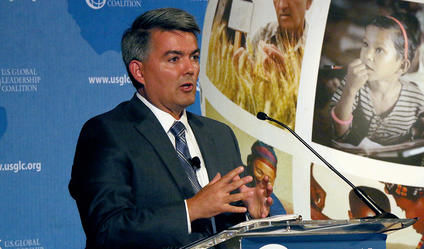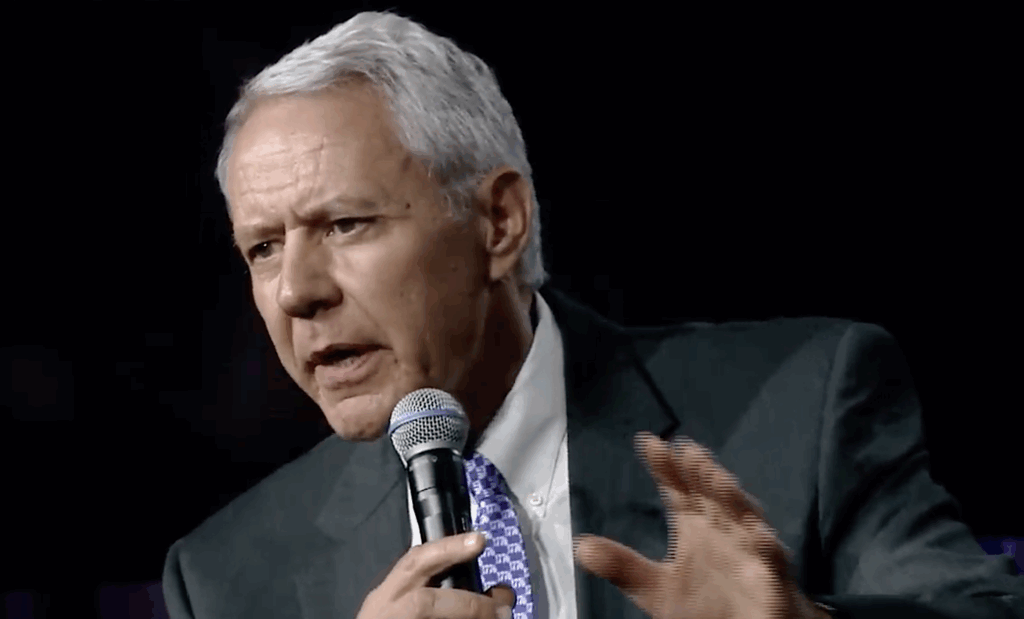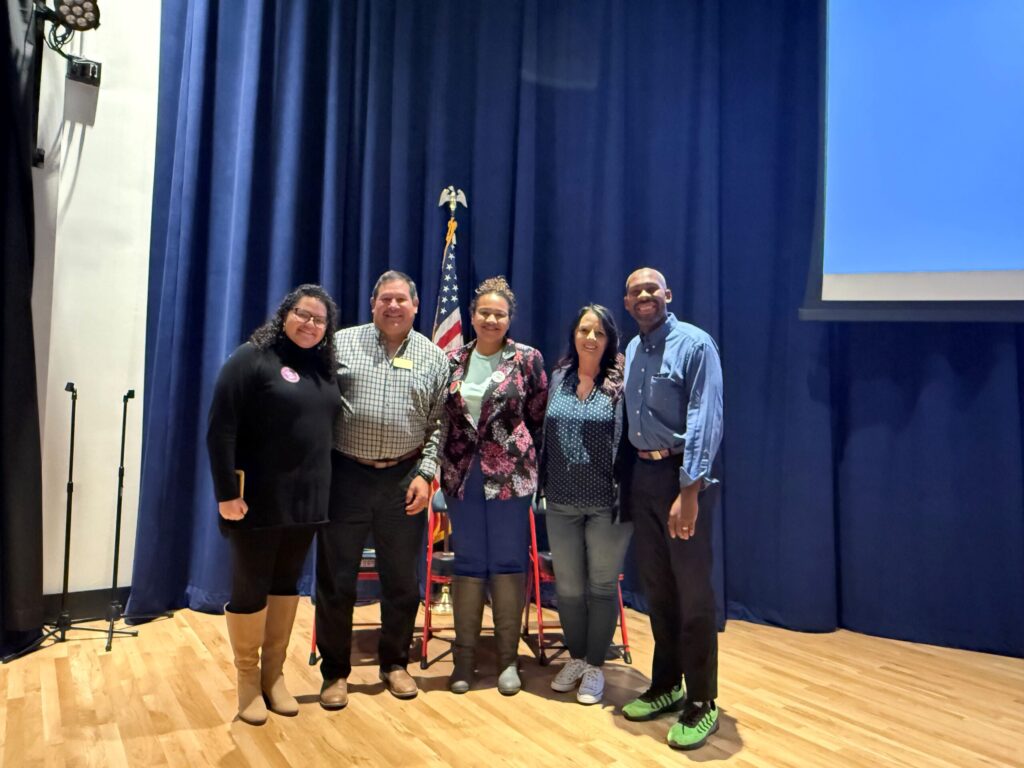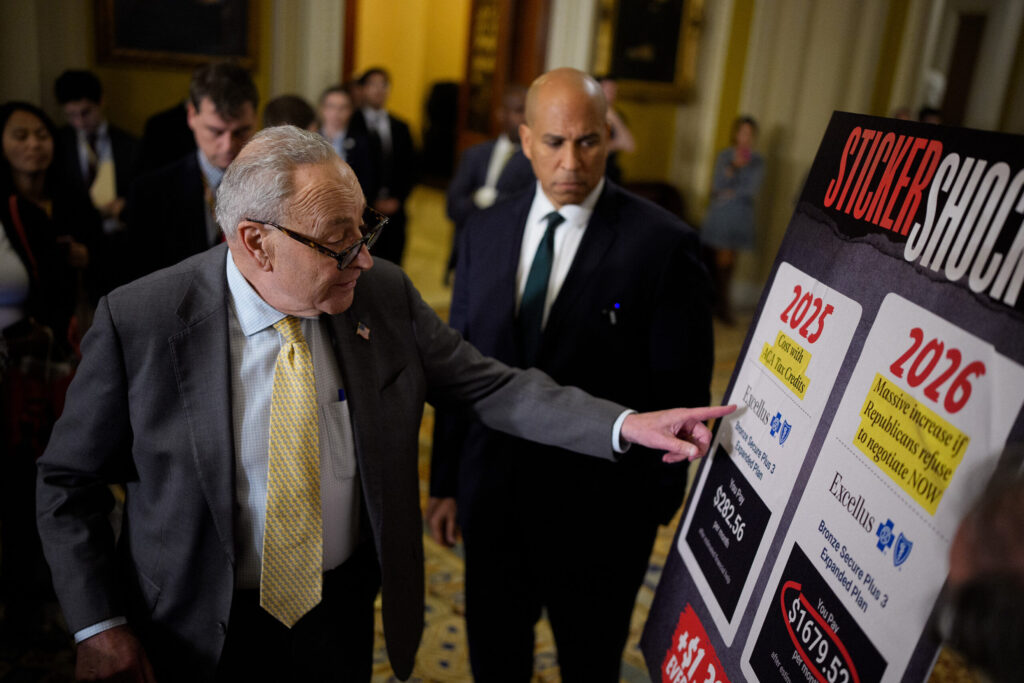Gardner, Hancock call for strong U.S. role overseas at foreign-policy forum

U.S. Sen. Cory Gardner and Denver Mayor Michael Hancock may not agree on everything, but they both want to see the United States fulfill its role as a global leader, not withdraw from it.
They joined foreign-affairs specialists Friday at the Ritz-Carlton Denver for a policy discussion sponsored by the U.S. Global Leadership Coalition, which backs civilian-led efforts to promote U.S. economic development overseas, foreign aid and diplomacy.
“In Colorado, the USGLC has assembled a distinguished group of leaders both Republican and Democrat who believe that America must be a global leader,” Hancock told the packed lunch crowd. “I know you’re here because you believe that too — not only because it’s the right thing to do, but also because, for all of us in this world and society, it’s the smart thing to do.”
A hallmark of the 20-year-old coalition is its fierce commitment to bipartisanship, which was evident during the panel discussion. Those at the forum spoke out strongly in favor of greater U.S. involvement in global affairs while warning against alienating allies and embracing isolationism, but avoided pointing fingers at either party.
“This is an American problem, not a Republican or Democrat problem,” said retired Marine Gen. James Mattis. “This is an American problem where our friends no longer know if we’re reliable, from Brussels to Tel Aviv to Tokyo. And our enemies are growing scornful. We’ve got to get back in the game and stop sitting on the sidelines.”
Gardner, a member of the Senate Foreign Relations Committee, said there was much discussion during his recent trip to the Middle East over what would happen if U.S. forces withdrew from Afghanistan on a timeline as they did in Iraq.
“The answer was clear: If we withdraw in a fashion that allows what happened in Iraq to happen in Afghanistan, then good work we’ve seen in Afghanistan will disappear,” Gardner said. “We are actually seeing results in Afghanistan. We are starting to see millions of girls in school. We have seen the literacy rate increase dramatically in Afghanistan.”
“If we withdraw to a level that we saw in Iraq, then we will repeat the mistake of Iraq and we will not have learned from it. And I think that will erase all the good we’ve done,” Gardner said.
The event, cosponsored by groups such as the Counterterrorism Education Learning Lab, the Colorado Chamber of Commerce and the Colorado Oil and Gas Association, emphasized the benefits from foreign-aid spending, which accounts for 1 percent of the federal budget.
The coalition reported that Colorado exported $8 billion in goods and services to foreign markets in 2013, and foreign trade supported more than one in five state jobs.
“I’m at a town meeting and somebody will stand up and say, ‘If you just cut foreign aid, we could eliminate the deficit,’ or, ‘We could balance the budget,’” said Gardner. “We have to be honest and say, one, not only is that not true, but two, here’s what foreign aid does and here’s what it means”
Republicans, including Gardner, lined up with President Obama to support fast-track authority for the Trans-Pacific Partnership but have staunchly opposes the administration’s proposed Iranian nuclear deal.
Gardner said the agreement fails to eliminate Iran’s ability to develop a nuclear weapon while providing billions to the country by lifting sanctions on escrowed accounts.
While reports on the funds available to Iran vary, “It doesn’t matter if it’s $56 billion, $100 billion or $150 billion, the challenge is going to be that that is a major infusion of cash to an economy that will be allowed to grow, to thrive to flourish, [and] in 10 years become a nuclear threshold state,” he said.
“Yet we have done nothing in the agreement to address the issues of terrorism and continued state sponsoring of terrorism,” Gardner said.
Supporters of the agreement are urging House and Senate Democrats to stand with the Obama administration against Republican opposition. Democratic Rep. Ed Perlmutter, for example, has come under pressure from groups including Moveon.org and ProgressNow Colorado to support the deal.
Perlmutter, who played a round of golf with President Obama two weeks ago in what was seen an example of friendly White House lobbying, has said he is “encouraged by the deal reached” but has not committed to voting for it.
While the president has said the deal is needed to reduce the risk of war by preventing an Iranian nuclear state, Gardner argued that the agreement actually makes the Middle East more dangerous by failing to contain a nuclear Iran.
“I’m concerned that after Year 10, we result in a situation where, thanks to allowances for advanced centrifuge research and certain provisions that remain in the agreement, that Iran will be able to emerge from the 10-year time period with an industrial-sized nuclear program,” Gardner said.
Mattis cautioned that other nations, starting with China, could move to fill the vacuum left by a lack of U.S. leadership, although former Ambassador Christopher Hill argued that China has its hands full with its own struggles in East Asia.
“When I look at China, I see a country in transition and a country in turmoil,” said Hill, dean of the Korbel School of International Studies at the University of Denver. “I think China has a lot of problems which will forestall any talk, any realistic prospect of China usurping our role.”
Analysts have predicted that foreign policy will be increasingly important for voters in 2016, spurred in large part by fears over terrorist groups.
Gardner said he has seen a surge in interest on national security issues since he ran for the House in 2010.
“In 2010, I can count on one hand the number of times foreign policy was brought up in that election. And things were still happening in Iraq,” Gardner said. “And yet it didn’t come up. In 2014, it was a constant part of the debate.”
The voters, he said, “understand what’s at stake.”















